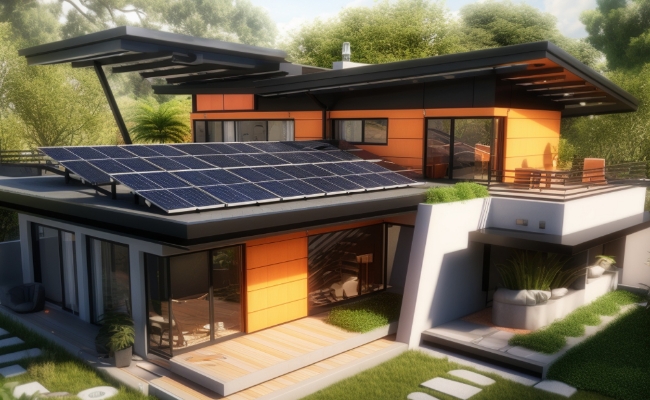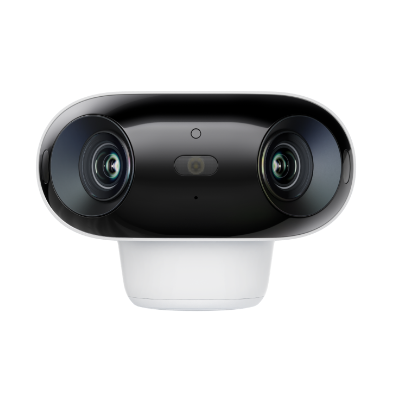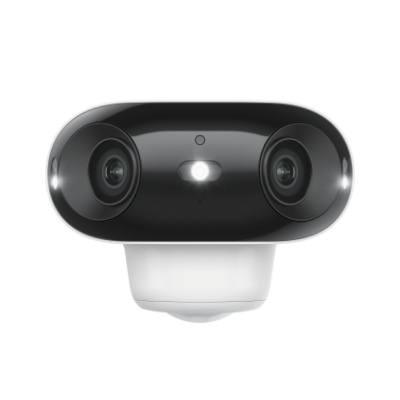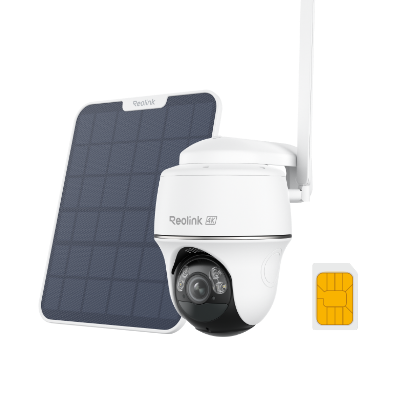Solar Power Simplified: Smart Home Solutions for Cleaner, Greener Living

Solar energy systems are an innovative find to power your homes and industries by generating green electricity for free. They are modernized as smart home solar to integrate with the devices to monitor and power them.
Users are eagerly switching to smart solar systems because they enhance convenience by automating their homes. In this article, we will discuss smart home solar and let you know the compatible devices.
Smart Home Solar Reviews
What Is Solar Smart Home?
Smart home solar is an advanced technology to integrate smart devices with solar energy systems by powering them.
It improves the efficiency of a general solar system by automating and controlling the devices with a click. You can remotely access and monitor the smart devices with your mobile phones. As everything is solar powered, you don't have to worry about the electricity cost and carbon emissions.
Components Of Smart Home Solar Systems
Solar Panels
Solar panels are the primary part of a smart home solar system. Their mechanism works with the sunlight. When the radiation strikes the photovoltaic cells, it converts it to electricity to power the home appliances. Solar panels are installed on the roofs and open areas where they can capture enough sunlight.
Inverter
The inverter is a device that converts the DC electricity generated by the solar panels into AC. It is the most crucial component because most household devices are powered with AC. They are also known for optimizing the performance of solar panels.
Energy Monitoring System
The energy monitoring system shows you real-time power consumption and generation data. It allows you to keep tracking the daily usage of smart home devices and enhance the system's performance. The users get the consumption information which helps to optimize the daily usage.
IoT Connectivity
IoT connectivity allows users to establish a seamless connection with the smart devices in their homes. The users can easily connect their smart devices and control the entire home remotely.
Smart Devices
Smart devices are intelligent electronic gadgets that automate your home with voice commands and one-tap control. These devices easily connect with your mobile phone and allow you to monitor and control them with an app. The smart devices include security cameras, smart lights, thermostats, and many others.
How Can Solar Energy Be Used In A Smart Home?
The electricity generated from solar panels is used to power smart devices for remote access. You can monitor the daily usage and optimize it further to reduce the load.
The heavy batteries can store the excess solar energy produced during the peak hours to use later. The excess electricity can be sold to the power suppliers through the grids to get financial benefits.
Pros And Cons Of Solar Smart Home
Pros Of Smart Home Solar
Energy Efficiency And Sustainability
The smart home solar is a clean energy-generating technology that saves our environment from carbon emissions and reliance on fossil fuels.
These are the most efficient and sustainable because of their longer lifespan and resistance to climate change.
Cost Savings (RoI)
The solar smart home significantly impacts your daily expenses on the electricity costs. It reduces the cost with a one-time investment and allows users to generate electricity according to their use. Meanwhile, the house owners get the advantage by feeding back the electricity to the suppliers and getting monthly credits.
Grid Independence And Resilience
Our conventional power supply is from the grids installed outside our houses but solar has taken over that and provided complete independence. The house owners have the resilience to use the generated electricity in electrical breakdowns and emergency situations.
The solar systems have reduced the reliance on the grid system and allow the user to access their generated electricity continuously.
Environmental Impact
Clean energy resources keep the environment free from dangerous emissions that can affect the ozone layer. It decreases reliance on non-renewable resources and eliminates fossil fuel use. The contribution will lead to a clean and fresh environment for future generations.
Future Outlook
People are installing smart solar systems in their households to protect the environment. It is also an efficient way to contribute to advancements and automating your home with smart devices. It is a future-proof investment that will bear fruits for a long time.
Cons Of Smart Home Solar
Initial Cost And Financing
The initial cost is the most critical barrier to the house owners installing it. As the solar system needs solar panels, a battery for storage and an inverter to convert the electricity, it increases the cost due to the number of components. However, the initial cost is higher, but it's a long-term investment.
Technical Limitations And Compatibility Issues
Solar panels are extremely dependent on the roof orientation and shade-proof areas, causing technical limitations. The panels must get enough sunlight and your house should not be surrounded by large buildings or any other obstacle resisting the sunlight. Some Solar panels are incompatible with the existing wiring and systems, so you must have a complete installation plan.
Long-term Performance And Durability
Solar panels usually have a longer lifespan but may degrade due to bad weather conditions, mishandling, and strong impacts, making them less durable.
This factor may vary by the quality of solar panels and their sustainability in harsh climates. You must buy a high-quality solar system and ensure proper maintenance and cleaning to make it durable.
What Devices Are Compatible With Solar Smart Home?
Home Energy Management Systems (HEMS)
HEMS is a digital system that helps to manage and monitor your smart home solar system efficiently. They provide insights about your daily consumption and allow you to adjust the settings to maximize efficiency and savings.
Smart Lighting Systems
The smart lighting systems integrate with smart solar and provide remote access to the entire house. You can adjust the brightness and color to whatever you are comfortable with. It allows you to schedule the lightning to minimize energy waste.
Smart Security System
The new Reolink Argus 4 Pro is an excellent choice for optimal and smart security. It is compatible with the Reolink Solar Panel 2, and just 10 minutes of charging provides 24 hours of performance. The ColorX technology eliminates the need for traditional IR lights, which helps extend the camera's battery life. Users can enjoy full-color night vision with 30% more battery efficiency.
4k 180° Wire-free Color Night Vision Camera
4K UHD 180° Blindspot-free View; Color Vision Day and Night; 30% More Battery Life; Dual-band Wi-Fi 6; Smart detection.
For a budget-friendly option with solar power, you can also consider the Reolink Argus 4.
4k 180° Blindspot-free Wi-Fi 6 Camera
4K UHD 180° Blindspot-free View; Dual-band Wi-Fi 6; Smart detection; Easy Installation Anywhere
You can also consider the Reolink Go PT Ultra is an excellent option for optimal and smart security. It has a built-in rechargeable battery that can be powered using a small solar panel. It works on 4G LTE, so you don't need Wi-Fi, and it can be used as a standalone device anywhere.
4K 8MP Wire-Free 4G LTE PT Battery Camera
4K 8MP; Smart Detection; 355° Pan & 140° Tilt; Battery/Solar Powered; Color Night Vision; Smart Real-Time Alert.
Smart Thermostats
Smart thermostats contribute their part by regulating your house's heating and cooling environment. You can control the temperature remotely according to the weather conditions. The thermostats allow you to schedule temperature setup for day and night according to your requirements.
Smart Appliances
Refrigerators, washing machines, and dishwashers are the common smart appliances powered by smart solar systems. They have smart energy-saving features to prevent excess use of electricity. Moreover, you can control the application and voice commands, providing a hands-free experience.
Home Assistant
Various smart home assistants are powered by solar energy. They integrate with most of the smart devices and establish an automated ecosystem for the house. The users can control the devices with the voice commands.
FAQs
1. How many solar panels are needed to power my smart home?
The number of solar panels may vary with the load requirements. You must calculate the power consumption of the house in KWh. However, 12-17 solar panels (500+ watts) can power a typical household with minimal appliances.
2. What is a smart solar system?
A smart solar system integrates with smart devices, enhancing user experience. The house owners get a hands-free experience by automating their homes with smart devices and using renewable and clean energy sources.
3. How long do solar panels take to pay for themselves?
Usually, the solar panels are a long-term investment because of their durability. High-quality solar panels are sustainable in different environments. In general, they can pay the complete cost within 7 to 12 years.
Conclusion
Smart home solar systems reduce the carbon footprint and fossil fuel usage to encourage people towards a modern way of living. All smart devices can be powered through clean and green energy while saving money on hefty electricity bills. We can expect a greener future by contributing to these renewable energy innovations.
Search
Subscribe for the Latest Updates
Security insights & offers right into your inbox



